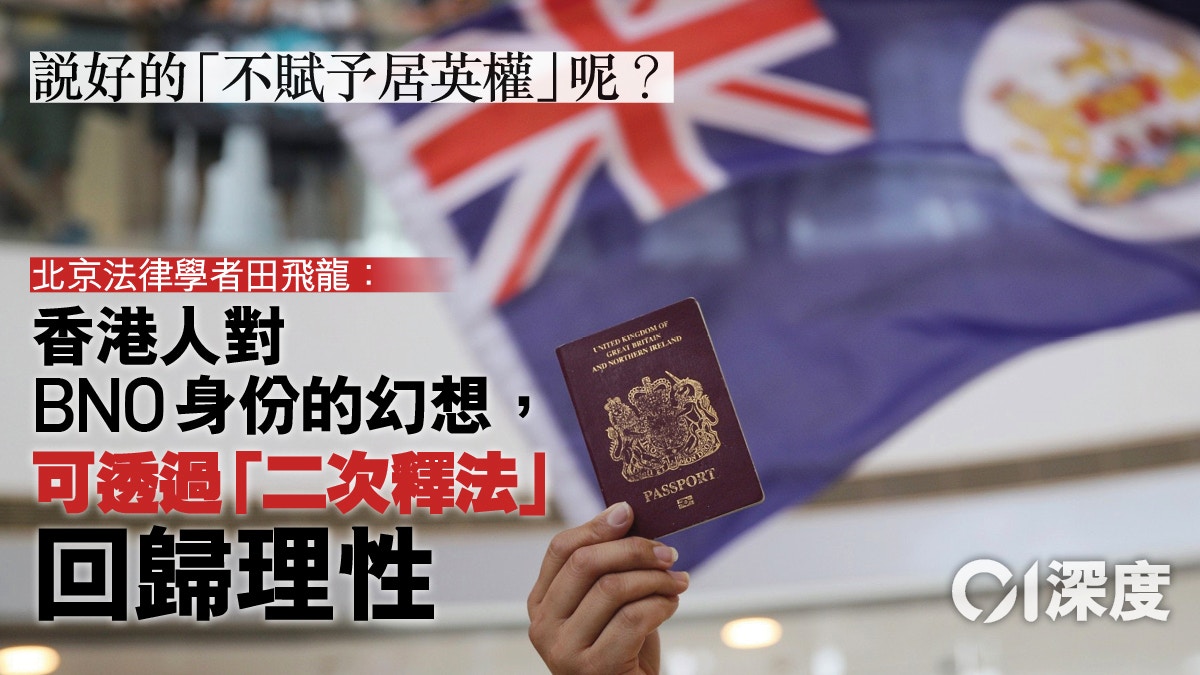weekly
Written by: Hao Ziyu and Huang Yunna
2021-01-22 21:04
The last update date: 2021-01-22 21:04
The anti-amendment turmoil came to the "Minato National Security Act", and the United Kingdom expanded the "right of abode" that was originally promised not to be granted to the holders of the "British National (Overseas) Passport" commonly known as "BNO" and introduced The "5+1" naturalization program will be open for application next Sunday (January 31).
The outside world generally believes that China will inevitably take countermeasures. However, whether it is aimed at all BNO holders or only those who obtain British nationality through BNO, whether it will "cancel Chinese citizenship" or "deprive Hong Kong resident status", there are divergent opinions in political circles.
Tian Feilong, director of the National Society for Hong Kong and Macao Studies, pointed out that the most feasible way is for the Standing Committee of the National People’s Congress to conduct a “secondary interpretation” in response to the interpretation of the “Chinese Nationality Law” applicable in Hong Kong in 1996. Recognizing BNO as a travel document will jointly restrict the civil and political rights of BNO holders in Hong Kong, and both require the SAR government to amend local laws and implement them in order to break the psychological dependence of Hong Kong people on British heritage.
Who is it that "violated the Sino-British Joint Declaration"?
Whenever disputes over "one country, two systems" are involved, there are always people who "violate the Sino-British Joint Declaration", and this "BNO power expansion dispute" is no exception.
The United Kingdom launched the "5+1" program on the grounds that the "Hong Kong National Security Act" violated the "China-UK Joint Declaration" and undermined Hong Kong's freedom of speech, allowing BNO holders and their families to extend their visa-free entry period. From six months to five years, you can enjoy the right to work or education during the period, after which you can apply for permanent settlement, and you can apply for naturalization after living for one more year and become a British citizen.
However, looking around the "Sino-British Joint Declaration", it does not specify that Hong Kong cannot enact the provisions of the National Security Law. Instead, it reiterates that the Hong Kong Special Administrative Region protects all rights including freedom of speech in accordance with the law-but even the United Nations "Citizen Rights" The International Covenant on Political Rights also points out that the right to "freedom" is not supreme, but is accompanied by special responsibilities and obligations, and requires legal restrictions to respect the rights of others, protect national security, maintain public order, and protect public health.
Whenever disputes over "one country, two systems" are involved, there are always people who "violate the Sino-British Joint Declaration", and this "BNO power expansion dispute" is no exception.
(Profile picture)
China also criticized Britain's "5+1" plan as "violating the "China-Britain Joint Declaration". What are the reasons?
Then we must first clarify the root cause of BNO-in the memorandum of the "Sino-British Joint Declaration", the United Kingdom clearly promised that after the return of Hong Kong, the original "British Dependent Territories citizens" who could freely enter and leave the United Kingdom but did not have the right of abode (that is, acquired Hong Kong before 1983) Permanent resident status, or persons born in Hong Kong after 1983) will no longer be "British Dependent Territories citizens", "but they will be eligible to retain a certain proper status to allow them to continue to use passports issued by the United Kingdom government without granting them Right of abode in the United Kingdom"; since 3.5 million of the more than 5 million Hong Kong population at that time had the status of "British Dependent Territories Citizens", and another 2 million were eligible to apply, given that the "Reversion of Hong Kong" may trigger the "British immigration" In order to control the immigrant population, the United Kingdom has established a "British National (Overseas)" status for the latter to apply for, allowing them to travel to the United Kingdom without a visa, but they do not enjoy the right of abode or enjoy consular protection in China.
Therefore, in 1996, the Standing Committee of the National People’s Congress explained the implementation of the Nationality Law of the People’s Republic of China in Hong Kong, reiterating that all Hong Kong residents with Chinese descent, regardless of whether they hold a “British Dependent Territory Citizen Passport” or “British National (Overseas)” Passports (ie BNO) are all "Chinese citizens", but they can continue to use travel documents issued by the United Kingdom to travel to other regions, but they cannot enjoy consular protection in China (including Hong Kong), and Hong Kong Chinese citizens with foreign residency rights are the same .
"5+1" plan changes the legal nature of BNO
Tian Feilong, director of the National Society for Hong Kong and Macau Studies and associate professor of the Beijing University of Aeronautics and Astronautics School of Law, explained to Hong Kong 01 that based on the Sino-British Joint Declaration and related negotiations, BNO is legally a Hong Kong-British colonial heritage, and it is both a British and Hong Kong resident. The remaining identity link between China and Britain is also a compromise arrangement confirmed by China and Britain-that is, China recognizes that BNO is a legal travel document but does not recognize the qualifications for consular protection, while the British promises not to upgrade or even change the nature of BNO into a complete citizen passport .
Tian Feilong emphasized that under the original agreement, BNO is only a travel document, and does not involve qualifications related to "civil rights" such as naturalization, voting, long-term residence, etc.; however, when the United Kingdom launched the "5+1" program to expand the BNO The BNO’s own rights and the nature of the law are clearly changed by amending the local "Nationality Law" to include it in the "Citizen Passport" sequence, which is contrary to the "Sino-British Joint Declaration" which "does not grant residence in the United Kingdom". Rights”.
After the UK announced its expansion plan in the middle of last year, it has triggered a strong backlash from the Chinese Ministry of Foreign Affairs, indicating that it is considering no longer recognizing BNO as a valid travel document and reserves the right to take further measures.
After the ups and downs of the anti-amendment legislation and the reconstruction of the international interest pattern after the Sino-US trade war, the outside world generally believes that China will inevitably take a strong countermeasure, and the date of application for the plan (January 31) is approaching, and the political circles are even more right. There is a lot of discussion about the measures, and they believe that in addition to whether the certification is valid, there may be more vigorous countermeasures, which mainly involve two major issues-first, for the target, it is all BNO holders and the "5+1" plan Applicant, or will eventually obtain British citizenship through the scheme?
Secondly, with regard to related rights, will it "cancel Chinese citizenship" or "deprive Hong Kong resident status"?
After the UK announced its expansion plan in the middle of last year, it has triggered a strong backlash from the Chinese Ministry of Foreign Affairs, indicating that it is considering no longer recognizing BNO as a valid travel document.
(Profile picture)
"Second Interpretation" is a choice between Chinese and English
Tian Feilong agrees that in addition to considering no longer recognizing BNO as a travel document, the central government may add more countermeasures, including the cancellation of the political qualifications and benefits of Hong Kong BNO holders, so as to achieve a "compulsory cutting" nationality law. Status, the person concerned chooses between "right of abode (British citizen)" and "right of abode (Chinese citizen)".
Some people may ask, BNO is obviously only used as a travel document, why should it be disqualified from political qualifications and benefits?
Tian Feilong explained that the central government might focus on countermeasures based on the two points of "comprehensive governance" and "struggle for foreign-related national interests," because the escalation and degeneration of BNO may open the door to "immigrants" and damage the stability of Hong Kong’s hearts and assets. It not only undermines the prosperity of Hong Kong, but also affects the identity system and legal basis of Hong Kong residents; therefore, if Hong Kong residents insist on "love the country and love Hong Kong" and "no longer be obsessed with transgender BNO documents", they can still fully enjoy all the protections of the Basic Law Legal rights, but if someone becomes a "two-faced person" in order to cater to the UK, he will inevitably lose his existing rights, that is, all the rights and benefits based on "Hong Kong residents" in the Basic Law.
As for individual people who are ready to immigrate to the UK and voluntarily give up their rights in Hong Kong, Tian Feilong believes that this is a "personal free choice" and the central government will not deliberately stop it, but he also reminds these "immigrants" that they need to think carefully, if they choose to become 100% British citizens should no longer have any legal ties with China and Hong Kong, because the era of double-sided profit is coming to an end, and the original legal environment is changing rapidly.
So, in terms of specific operations, what legal measures can the central government take?
As it involves the adjustment of the system with the implementation of the "Chinese Nationality Law" in Hong Kong, Tian Feilong judged that the most feasible method is the "secondary interpretation", that is, the Standing Committee of the National People's Congress has included in the "Basic Law" Annex III and passed in 1996 "Interpretation on Several Issues Concerning the Implementation of the "Chinese Nationality Law" in the Hong Kong Special Administrative Region" (hereinafter referred to as "Interpretation") explained again-not only no longer recognizes BNO as a travel document, but also restricts the civil affairs of BNO holders in Hong Kong And political rights, and both require the Standing Committee of the National People’s Congress to provide a clear constitutional basis through interpretation, and then the SAR government will amend local laws to enforce them.
Tian Feilong believes that based on the habitual dependence of Hong Kong society on the Basic Law and the central government’s political considerations for Hong Kong’s stability, coupled with the contingency mechanism of the Basic Law itself, the "secondary interpretation" should be easier to obtain from Hong Kong people. Understanding and identification; in addition, this also helps some Hong Kong people to dispel the illusion of BNO status, making the psychological dependence and interest ties under the British colonial heritage of Hong Kong increasingly weak and unbearable.
The picture shows on July 1, 2019, demonstrators in London, UK, took to the streets to fight for the rights of British National (Overseas) passport holders.
(Getty Images)
Three situations determine Hong Kong rights
We might as well deduct it in a sand table. If a "secondary interpretation" is carried out according to the "Interpretation", what changes may occur?
Looking up the "Interpretation", Article 2 concerning the BNO states that "All Hong Kong Chinese compatriots, regardless of whether they hold a "British Dependent Territory Citizen Passport" or a "British National (Overseas) Passport", are Chinese citizens. Since 1997 From July 1, 2016, the above-mentioned Chinese citizens may continue to use the valid travel documents issued by the British government to travel to other countries or regions. However, in the Hong Kong Special Administrative Region and other parts of the People’s Republic of China, they shall not be allowed to enjoy the above-mentioned British travel documents. The right of consular protection"-it can be seen from the provisions that the most direct way to counteract is to add subsidiary clauses, stating that in view of the unilateral change of the legal nature of BNO in the United Kingdom, China can no longer treat it as a travel document; however, If they want to cancel their political qualifications and benefits together, what can they do?
It is important to know that the Basic Law grants relevant rights on the basis of "Hong Kong residents". To cancel the relevant qualifications of BNO holders, it is necessary to clarify whether they are still "Chinese citizens" and "Hong Kong residents."
In view of the fact that once Hong Kong citizens of BNO holders are naturalized by the "5+1" program, there will be a "dual nationality" problem. At that time, it is believed that China may implement the "single nationality" principle instead of recognizing their "Chinese citizen" status , There may be several situations-first, if you are not a "Chinese citizen" but a "permanent resident" among the "Hong Kong residents", you can no longer use the "SAR Passport" and the "Homecoming Permit", but still You can enjoy the right to vote, apply for public housing, low-cost public medical services, free basic education, receive comprehensive assistance, and serve as civil servants. Second, you are not a "Chinese citizen" but a "non-permanent resident" among the "Hong Kong residents". Except for education and education, none of the above-mentioned rights can be enjoyed. Third, it is not a "Chinese citizen" or a "Hong Kong resident", that is, it has nothing to do with China and Hong Kong, and all rights cannot be enjoyed.
It is believed that China may implement the "single nationality" principle instead of recognizing their status as "Chinese citizens."
(Profile picture)
How to resolve the confusion in Hong Kong's identity system?
However, it is worth mentioning that if China implements the "single nationality" principle and denies the status of "Chinese citizen" as a British Hong Kong citizen through the "5+1" program, then there are two other types of "Chinese citizens" covered by the "Interpretation". Hong Kong residents of Chinese descent-who have obtained British citizenship and the right of abode in other countries as a result of the "British Right of Abode Scheme", should they continue to acquiesce to the existence of "dual citizenship", that is, continue to treat them as For "Chinese citizens" and "Hong Kong residents", they are also allowed to use their passports to enter and exit other regions, but they are not entitled to consular protection in China?
The so-called "one code to one code" is the BNO power expansion dispute. There is indeed no reason to "spread" other established facts based on historical reasons, so the "second interpretation" should only involve BNO holders; however, Global politics are turbulent and Hong Kong has just experienced major social turmoil. The problem of "popular estrangement" based on "opening only eyes and closing eyes" is obvious. Then should the principle of "single nationality" be implemented to the end, that is, other nationalities should be handled together problem?
This is probably an unavoidable reality.
Hong Kong should revise the current "resident-based" identity system to be "citizen-based."
(Profile picture)
Establish an identity system for "Chinese Hong Kong Citizens"
Why is the principle of "single nationality" important?
This is closely related to the political loyalty and rights and obligations of citizens.
Regardless of how the issue of nationality is resolved, the Hong Kong resident status system is actually very vague, which has long caused the "Chinese citizens" among the "Hong Kong permanent residents" to fall into this awkward situation of "two sides are not human."
In constitutional science, "citizen" is the subject of "fundamental rights"; however, based on "one country, two systems", the Basic Law never has a real "citizen concept", but uses "Hong Kong residents" as the "basic rights." The main body of "Permanent Residents" as the prerequisite for "political rights", but at the same time requires "Hong Kong residents" to fulfill the "civil duty" and "political morality" relative to the country.
"Hong Kong 01" has long called on Hong Kong to amend the current "resident-based" identity system, change it to "citizen-based", and build a set of "citizens-permanent residents-non-permanent residents" three-level citizens exclusively for the "Hong Kong Special Administrative Region of China" System, to clearly clarify what kind of civil rights the country and the special zone should give us, and how we should respond to the country and the special zone's civic obligations, so as to reflect national sovereignty, cultivate civic awareness, and reshape identity.
[BNO Expansion] Britain creates "Filling Taicha Rice", Hong Kong may hardly enjoy "dual citizenship"
The expansion of BNO's power highlights the British hypocritical dual citizenship Hong Kong people must choose one of the two?
The lack of labor after Brexit is the benefit of BNO's expansion
BNO|It's time to solve "dual citizenship" and establish a "Chinese Hong Kong citizen" identity system
BNO British National (Overseas) Passport British immigration Hong Kong people immigration nationality in-depth report







